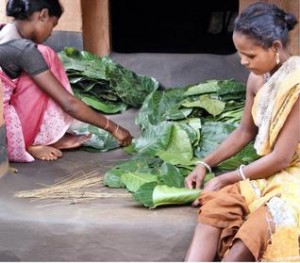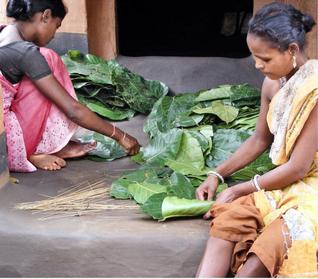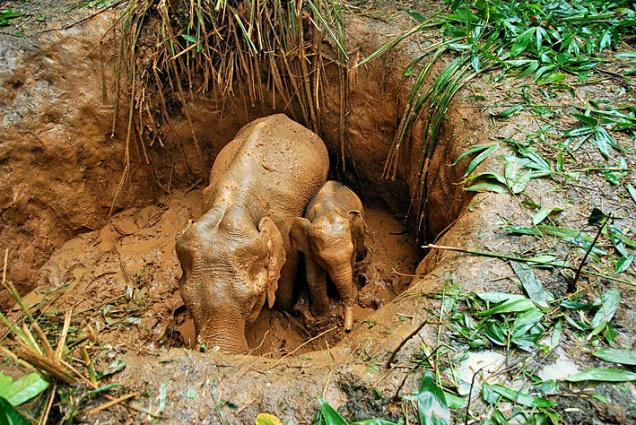Sustainable development is not an alien concept in India. In fact, for centuries people living within the forest and in villages have practiced a lifestyle that work with nature. The forest and natural resources are used but not abused. It is simply a way of life. But the modern way of life has changed dramatically. We have suddenly begun to consider that progress cannot occur without massacring the natural resources. Sometimes even under the label of eco-development, the activities that are carried out in rural and forest areas is hardly a sustainable route.
Here is a story from Orissa that highlights this core issue and the need for officials, and makers of modern India to look at the sustainable way of life that is already existent before they move to reform India.
 Manchabandha Reserve Forest in Orissa is home to humans as well as wildlife. They co-exist in harmony and peace. The Sal trees that cover the forest area form the chief source of food and income for the local tribes like Santhal, Kolha and Lodha who live in the nearby villages in the Mayurbhanj district. The chief economic activity of the tribal women is making Sal leaf plates. They also gather other forest products like mushrooms and the Mahua flowers.
Manchabandha Reserve Forest in Orissa is home to humans as well as wildlife. They co-exist in harmony and peace. The Sal trees that cover the forest area form the chief source of food and income for the local tribes like Santhal, Kolha and Lodha who live in the nearby villages in the Mayurbhanj district. The chief economic activity of the tribal women is making Sal leaf plates. They also gather other forest products like mushrooms and the Mahua flowers.
Pretty little shrines comprising of earthen animal idols can be found within the forest. Tribal women visit these shrines for worship every day. They ardently love the forest for all that it provides and feel a strong sense of belonging with it. It is a core belief that Gods protect them and the forest and they too in turn need to protect the forest. That is why the tribal women have formed a revolutionary organization called the Budhikhamari Community Forest Protection Committee (BCFPC) that covers 100 villages near the Manchabandha Reserve Forest. The group members keep an eye on any activity taking within the forest that may harm it.
Trouble in Paradise
In January this year, few tribal women noticed a lot of Sal trees being cut. Further investigation revealed that the tree felling activity had been started on account of the State Forest Department granting permission for the construction of an eco-tourism resort.
The women were disturbed.
The Indian Forest Act, 1927, which is the country’s main forest law, is a colonial one, and since it was enacted to serve the former British rulers’ need for timber, it does not speak of conservation. This is what makes the Scheduled Tribes and Other Traditional Forest Dwellers (Recognition of Forest Rights) Act, 2006, popularly called the Forest Rights Act, a key piece of legislation. The Act secures the rights of forest dwellers to land and other resources.
As per the Forest Rights Act, without taking the consent of local tribes, no construction work can be started for any development in a forest. But it seems that the fact was ignored when the Sal trees were cut down without informing the tribal settlements.The fencing process of the entire forest and the road construction was commenced by the Forest Department while the local body elections were on.
Vasundhara, a local partner of the international NGO, Rights and Research Initiative (RRI) revealed that in the initial stage of construction itself for the eco-tourism park, as many as 1500 Sal trees were cut down.
Under the eco-tourism project, the forest department planned to fence off the whole forest with only one gate for entry, enlarge existing ponds for boating, build a 3-km-long jogging track inside the forest, create sitting and dining places, build staff quarters, a watch tower and overhead tank for water supply, convert part of forests into lawns, panchakarma centre and a deer park.
Saving the Forest
Instead of keeping mum, the wronged tribal made a decision to voice their concerns & exercise their rights. Lilima, 23, from Gaudadiha emphasized that they would not permit outsiders to enter their forests and make the local women vulnerable. Sarla Devi Singh, 23, another woman leader from the village, agrees that Eco-tourism would make them vulnerable and take away their rights. She concludes that eco-tourism might become a threat to their culture & pose a danger for them.
In March this year, both these women motivated the masses and initiated a protest outside the district collector’s office. They made sure that the Divisional Forest Officer of Baripada received written instructions from the Collector to put an end to the Eco-tourism Project.
Positive Results
The efforts of the duo bore fruits and by March end, the eco-tourism project came to an abrupt halt marking the triumph of the tribal womens’ rights under the Forest Rights Act.
Thanks to the timely intervention of the tribal women, this time the Eco-tourism project came to a standstill. Even in future, the Tribal women of Baripada are clear about their intention and commitment to stand together and stand up for their rights. They pray in their sacred tree groves called ‘Jahira’ in tribal language for the well being of the villages and the forest and are united against the destruction of their homeland.
More Related Stories,
Fisherwomen in Orissa to the Rescue of Olive Ridley Turtles
Tips for an Eco-conscious Traveler by IUCN
Image via thehindu.com










One thought on “Tribal Women Save Forest being Cut in the name of Eco-tourism”